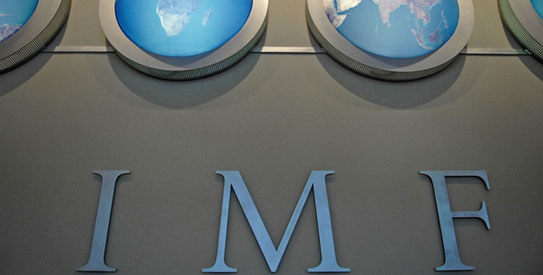KARACHI: Pakistan's fiscal deficit may exceed 7 percent of economic output, endangering its standing with international donors, due to a delay in implementing a reformed general sales tax, analysts said on Monday.
The International Monetary Fund said its executive board approved a nine-month extension of Pakistan's loan to give authorities time to finish the reforms. The loan program was scheduled to end this year, but will now run through Sept. 30, 2011, the IMF said.
“The extension will provide time to the Pakistani authorities to complete the reform of the general sales tax, implement measures to correct the course of fiscal policy and amend the legislative framework for the financial sector,” the fund said in a statement.
The RGST, which is supposed to replace the current general sales tax, was originally scheduled for implementation in July, but has been delayed several times since. Even its latest implementation date, Jan. 1, now seems unlikely.
The delays will squeeze revenue while Pakistan's spending surges in the aftermath of floods that have caused almost $10 billion worth in damage.
The floods, which began in late July, rolled from north to south in an unprecedented tide of destruction, destroying or damaging more than 1.7 million homes, official figures show.
The revenue shortfall could push the budget deficit above 7 percent of gross domestic product (GDP), analysts estimate, compared with the 4.7 percent target agreed with the IMF for fiscal year 2010-11.
“The rising fiscal deficit is squarely against one of the main covenants of the agreement with the IMF, which is likely to delay future tranches,” said Asad Iqbal, chief investment officer at Faysal Asset Management Ltd.
“If the IMF loses confidence in the government's ability to manage this deficit, funding from other foreign institutions is also likely to dry up, resulting in severe consequences for the country.” In November 2008, Pakistan agreed to an $11 billion bailout
program with the IMF to avert a balance of payments crisis. It received the fifth tranche of the loan -- $1.13 billion -- in May 2010.
The fund said its staff was “continuing its dialogue” with the Pakistani authorities on the loan program's next review.
The United States regards Pakistan as an important ally in its war on militancy in the region and the State Bank of Pakistan reported on Monday it had received $633 million in Coalition Support Funds from the United States.
But the delay in the sixth IMF tranche, a lack of foreign aid and the cost of rebuilding after August's floods has more than trebled government borrowing from the central bank, to a provisional 324.64 billion rupees ($3.785 billion) from July 1 to Dec. 11, compared with 106 billion rupees in the same period last year.
To try and make up the shortfall, the government is considering a “Plan B,” according to media reports.
This would end the current general sales tax exemptions that have been given to sectors such as textile and fertilizer production.
And while the government has not said there are alternatives being worked out, analysts said the exemptions may be quietly removed to avoid the kind of opposition that has greeted the RGST.
Imposing new taxes at the behest of the IMF, which is hugely unpopular in Pakistan, is a tough sell.
“There is no Plan B as far as I know,” said a senior government official, who requested anonymity because of the sensitivity of discussing tax reforms.
Reform would help curb Pakistan's endemic tax evasion -- its tax-to-GDP ratio is around 10 percent, one of the lowest in the world. But the RGST bill, introduced in November after months of delay, is vigorously opposed by almost every political party.
And while it will probably eventually pass, no one can say when or in what form. Thus, Plan B.
The Federal Board of Revenue has the authority to remove exemptions without the approval of coalition partners to the government.
Analysts said there may not be enough political will to implement even that change.
“The government does not realize the gravity of the situation and the sense of compliance is not there as they are not in pressing need to get a tranche released from the IMF because of the improving current account balance,” said Asif Qureshi, a director at Invisor Securities Ltd, adding that balance could easily deteriorate with the rise in oil prices.
Pakistan's current account has shown a surplus for the last three months. The IMF bailout was designed to shore up reserves and avert a balance of payments crisis. – Reuters














































Dear visitor, the comments section is undergoing an overhaul and will return soon.